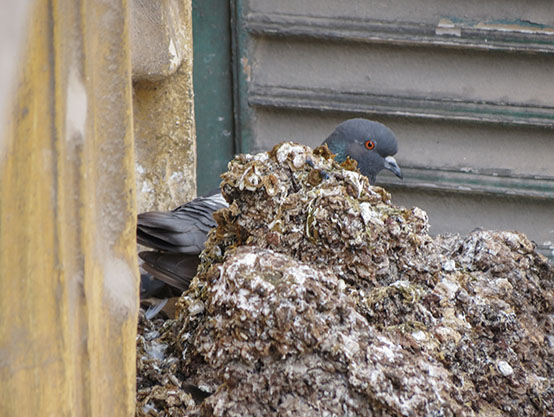Pigeon droppings or guano can mostly be found on the exterior of a building or home and can be a sight when there has been more than one bird in the affected area. They are very selective birds and once they have found a vantage point for food or for roosting, they tend to return. In large quantities, it can be really annoying and dangerous and if it’s around your home you might need someone who is a specialist in pigeon guano removal to come and safely clean the place. It is a task that can be done, but because of the dangers of serious illness or even death due to infections caused by coming into contact with their droppings it is ill-advised to try and get rid of large amounts by yourself. Calling in a professional service provider guarantees that the job is done effectively and lawfully as pigeons are protected by the Wildlife and Country Act and need to be removed from your premises by a registered service provider. These extreme methods of cleaning and removal are especially necessary if you have small children or elderly people living in your home with you as it can be a serious health hazard that can lead to hospitalization or even death in severe cases.
Why is pigeon guano so dangerous?
Pigeons are wild and don’t rely on an owner to feed them. They survive off food and water along the streets that can be highly contaminated and this can then be spread to humans through the droppings that they leave around the outside of your home. Sometimes their food source can come straight from the excrements left by pets and livestock on your property which can bring on a hoard of different illnesses. As a means of easy removal, a lot of people use ordinary scrapers or even hard bristled brooms to loosen and then remove the faeces without knowing how dangerous doing this is. All birds carry a form of salmonella and it is spread from bird to bird in no specific order and this along with one of the flu-like illnesses known as Psittacosis or Histoplasmosis are among the most common of the illnesses that you can pick up from pigeons. Their droppings attract small insects and mites that can later become a breeding hazard around your home, spreading whatever disease they got from the pigeons onto you through small bites on your skin.
Domestic cleaning processes
Pigeons like to poop in a particular place, hence the reason why you would find so many of them in one concentrated area. They are very selective about where they poop and even avoid pooping in-flight because they don’t like it landing on their own feet. If you would like to tackle the pigeon guano removal by yourself then you need to remember a few things. Before attempting a cleanup, spray the affected area with a mixture of water and vinegar and let it sit for at least 30 mins. This will soften the guano and prevent it from forming dust when you scrape it. Once you have scraped off the pigeon guano, use a bleaching agent and water to wash the area thoroughly. If you breathe in the dust you can put yourself at risk of developing one of the fungal infections and could need hospitalization. There are no primary symptoms of the illness, but it can be very dangerous for anyone with a compromised immune system or in small children. One case has officially been reported at the Queen Elizabeth Hospital in Glasgow where a child died because of a fungal infection after breathing in the dust of the guano. If there is a small number of droppings in isolated areas around the home then the risk would be less if you take caution with the pigeon guano removal, but again large amounts should be cleaned by a professional service at all times. Special gear needs to be worn and the area needs to be sprayed completely clean with chemicals to prevent any after-effects once the droppings have been loosened. When doing it at home by yourself you would need to wear gloves and a mask and place the clothing you wore in the wash immediately. Pigeons love returning to familiar areas so if you find their droppings around then it is most likely because they have been feeding on a nearby food source or have made a nest nearby for comfortable roosting. They also avoid pooping too close to their nests so if you find a concentrated amount of pigeon guano then it is likely that there is a nest nearby. Pigeons are protected by the Wildlife and Countryside act so removing their nests and eggs without the assistance of the law or a professional removal service that is registered with the local authorities could be seen as a serious criminal offence. Again, smaller pigeon guano removal tasks can be done by the homeowner with caution, but a professional service provider is always recommended to avoid the illegal removal of the birds. Other illnesses that are caused by pigeons are:
- Cryptococcosis is a yeast infection that can affect the central nervous system
- Candidiasis affects the skin and respiratory system
- Coli a bacteria that affects the lower intestine
Prevention methods
Most of the severe cases of illness that occur because of pigeon guano happen in more tropical regions where warmer weather is a contributing factor. There are regular infections in certain parts of the United States, like Mississippi where the climate is warmer and roosting is easily done because of the greener landscape and less urban environment.
The UK experiences less of these cases, but caution is still needed when attempting pigeon guano removal. Using gel repellent or anti roosting spikes can keep them off your property in the places where they are often seen. Reflective strips also help deter them from their landings. Pigeons are also known as the bullies of the bird species so getting fake birds for landscaping purposes could help them to back off from the area because they won’t be able to hustle away from a fake bird, but if you find that they are still an issue, contact a professional removal service immediately.
















